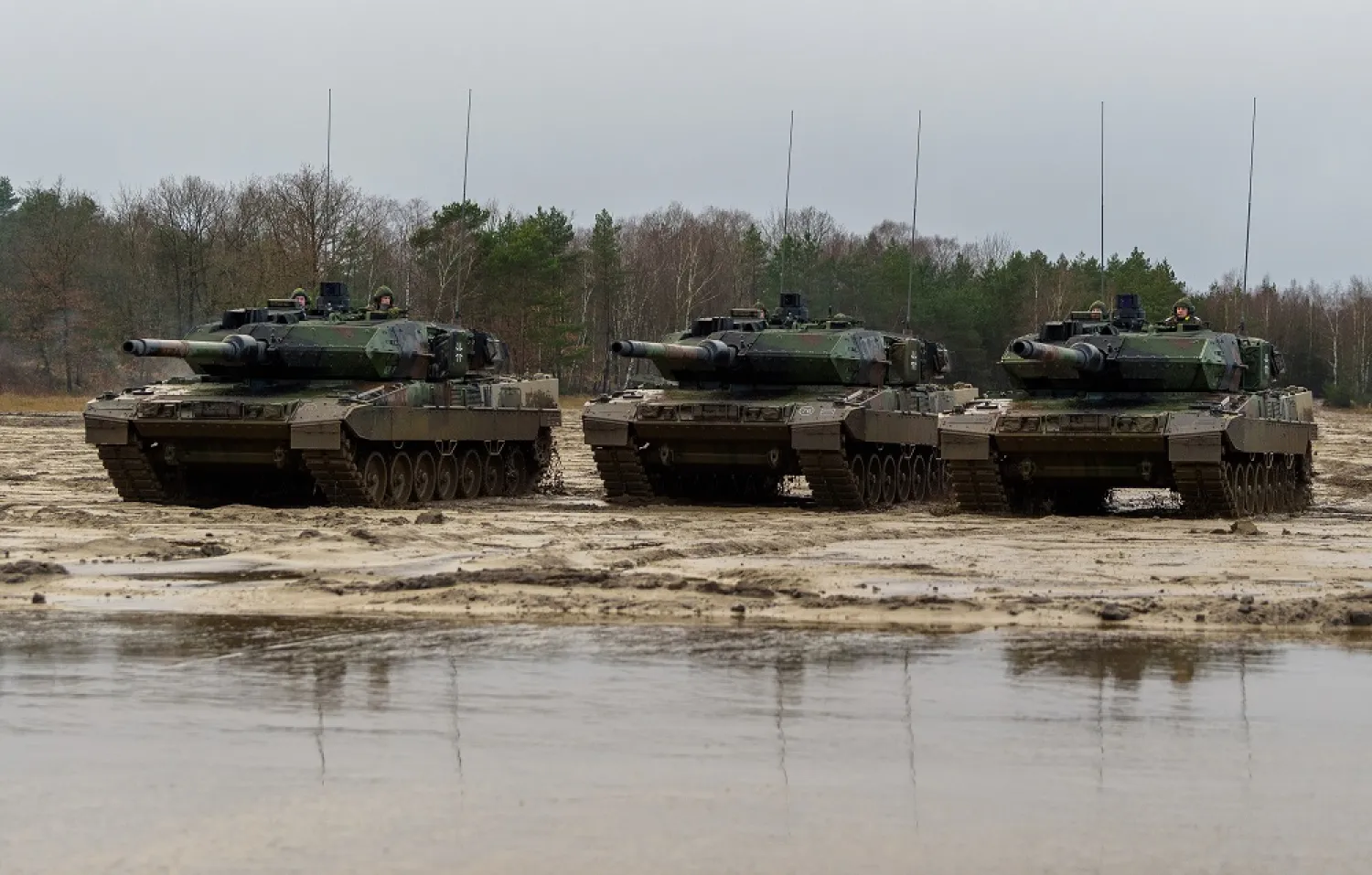Poland said on Monday it would ask Germany for permission to send Leopard tanks to Ukraine - and would send them whether or not Berlin agreed as long as other countries did too.
The Kyiv government wants the German-made Leopard 2, one of the most widely used Western tanks, to help it break through Russian lines and recapture territory this year.
Germany, which must approve re-exports of the Leopard, has held back, wary of moves that could cause Moscow to escalate, and says other NATO countries have yet to formally ask to re-export them.
On Sunday, German Foreign Minister Annalena Baerbock said Berlin would not stand in Poland's way, but Warsaw's call for a coalition signaled any transfer was still some way off.
Western countries have committed billions of dollars in new military aid to Ukraine in recent days: on Monday, European Union foreign ministers agreed to release their latest tranche, worth 500 million euros ($545 million), three sources said.
But at both Monday's EU talks in Brussels and last week's meeting of Western defense ministers in Germany, the issue of battle tanks dominated discussions.
"At this point there are no good arguments why battle tanks cannot be provided," Latvian Foreign Minister Edgars Rinkevics said. "The argument of escalation does not work, because Russia continues escalating."
Polish Prime Minister Mateusz Morawiecki, whose country, like Latvia, neighbors Ukraine, said Warsaw would ask Germany for permission to re-export the tanks to Kyiv.
"Even if we did not get this approval... we would still transfer our tanks together with others to Ukraine. The condition for us at the moment is to build at least a small coalition of countries," he said.
Poland has said it would provide a company of Leopards - around 14 - but Morawiecki said a transfer only made sense as part of a brigade - a variable but much larger number. Some 20 countries operate the tank, including Canada, Denmark, Finland, Netherlands, Norway, Austria, Spain, Sweden and Türkiye.
Ukraine and Russia are both believed to be planning spring offensives to break the deadlock in what has become a war of attrition in eastern and southern Ukraine as the first anniversary of the Russian invasion nears.
Ukrainian President Volodymyr Zelenskiy, meanwhile, was grappling with a corruption scandal that could dampen Western enthusiasm for his government.
A newspaper reported that the Ukrainian military had allegedly secured food at highly inflated prices, and a deputy minister resigned after an investigation into allegations he accepted a bribe.
Leopards on the move?
Ukrainian officials have been pleading with Western allies to supply them with tanks for months.
After Ukrainian advances in the second half of 2022, front lines have been largely frozen in place for two months, despite heavy losses on both sides. Ukraine says Western tanks would give its ground troops the mobility, protection and firepower to break through Russian defensive lines and resume their advance.
"We need tanks - not 10-20, but several hundred," Zelenskiy's chief of staff Andriy Yermak wrote on Telegram. "Our goal is (restoring) the borders of 1991 and punishing the enemy, who will pay for their crimes."
Arriving in Brussels on Monday, Germany's Baerbock declined to say if she had been speaking for the whole ruling coalition when she said Berlin would not prevent Poland re-exporting the tanks. Chancellor Olaf Scholz's Social Democrat party has expressed concern Russia might escalate or even retaliate.
Lithuanian Foreign Minister Gabrielius Landsbergis said the tanks should not be held up one more day, while Luxembourg's Foreign Minister Jean Asselborn said Russia could win the war if Europeans "don't help Ukraine with what they need now".
Defense analyst Konrad Muzyka said that if tanks were sent without Berlin's consent, Germany could at some point refuse to supply spare parts for them, which was why Poland was hoping other countries would also send Leopards.
"The political problem for Germany if they wanted to cut off the supply of spare parts would be much bigger if there was a coalition," he said.
‘Terrible war’
The Polish prime minister said Warsaw would also talk to countries with other modern battle tanks, without naming them.
American lawmakers pushed their government on Sunday to export M1 Abrams battle tanks to Ukraine, saying even a symbolic number would help push European allies to do the same.
Britain has said it will supply 14 Challenger 2 tanks to Ukraine. French President Emmanuel Macron said he did not rule out the possibility of sending Ukraine Leclerc tanks.
Leopards are more widely available than the British and French tanks, and use less fuel than the turbine-powered US Abrams.
The Kremlin said the splits in Europe over whether to provide tanks to Kyiv showed there was increasing "nervousness" within the NATO military alliance.
"But of course, all countries which take part, directly or indirectly, in pumping weapons into Ukraine and in raising its technological level bear responsibility" for continuing the conflict, Kremlin spokesman Dmitry Peskov said.
Since its invasion on Feb. 24, 2022, which it has cast as defending itself from an aggressive West, Russia has taken control of parts of Ukraine it says it will never return. Ukraine has said that restoring its territorial integrity is not open for negotiation.









